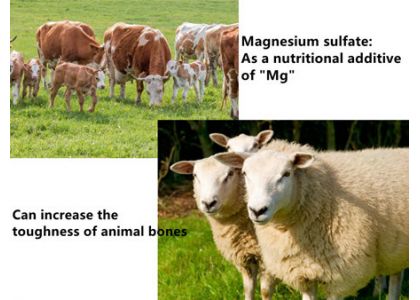
Magnesium sulfate is a compound containing magnesium, which is white and small inclined or inclined column crystal, odorless and bitter in taste. It is clinically used for catharsis, cholagogic, anticonvulsant, eclampsia, tetanus, hypertension, etc. However, in the feed, it is often used as an additive to supplement the magnesium element of livestock. Feed grade magnesium sulfate is used as a supplement of magnesium in feed processing. Magnesium is an indispensable factor in the process of bone formation and muscle contraction in livestock and poultry. It is an activator of various enzymes in livestock and poultry, and plays an extremely important role in material metabolism and neural function in livestock and poultry. If livestock and poultry lack magnesium, it will lead to material metabolism and nervous function disorder, supply imbalance, affect the growth and development of livestock and poultry, and even lead to death.
Magnesium in the animal digestive system is mainly absorbed by the anterior gastric wall in ruminants and the small intestine in non ruminants. Magnesium is absorbed through facilitation diffusion with its simple ions or formed chelates. The existence of magnesium sulfate is different, and the absorption rate of animals is different; Different kinds of animals have different absorption rates of magnesium; Even animals of the same species have different absorption rates of magnesium due to their different ages. The absorption rate of magnesium by cattle is 5%~30%, while that of pigs and poultry can generally reach 60%.
Magnesium is one of the important components of animal bones and teeth. There is about 0.05% magnesium in animals, and about 70% of it exists in bones as phosphate or carbonate. Magnesium sulfate is one of the structural components of animal soft tissues. 30% of magnesium in animals exists in soft tissues, such as liver, kidney, striated meat and brain. More than 70% of magnesium in blood exists in cells. Magnesium is directly involved in the composition of many enzymes (such as phosphatase, oxidase, peptidase, etc.) and can activate many kinds of enzymes, such as pyrophosphatase.
The use of magnesium sulfate in feed is quite eye-catching, but it should also be noted that the use of magnesium containing feed additives should pay attention to that non ruminant animals need less magnesium, generally 0.04%~0.06% of the whole feed, and ruminant animals need more magnesium, generally 0.2% of the whole feed. When producing and using magnesium containing feed additives, they must be mixed evenly to prevent magnesium poisoning of animals.
For professional magnesium sulfate manufacturers, you can find "Tianjin Xingyu Fertilizer Industry Co., Ltd.", which has 29 years of production history and has professional and rich knowledge reserves on various functions of magnesium sulfate